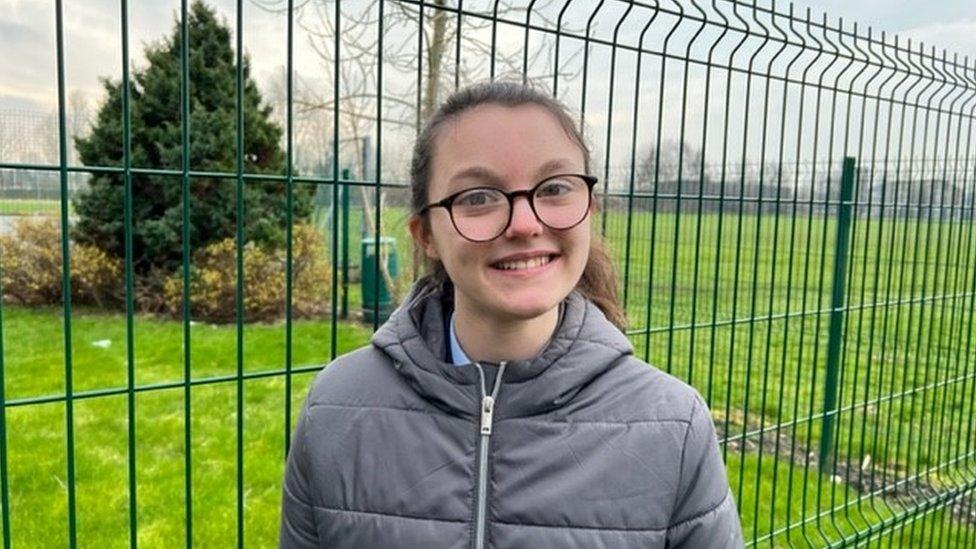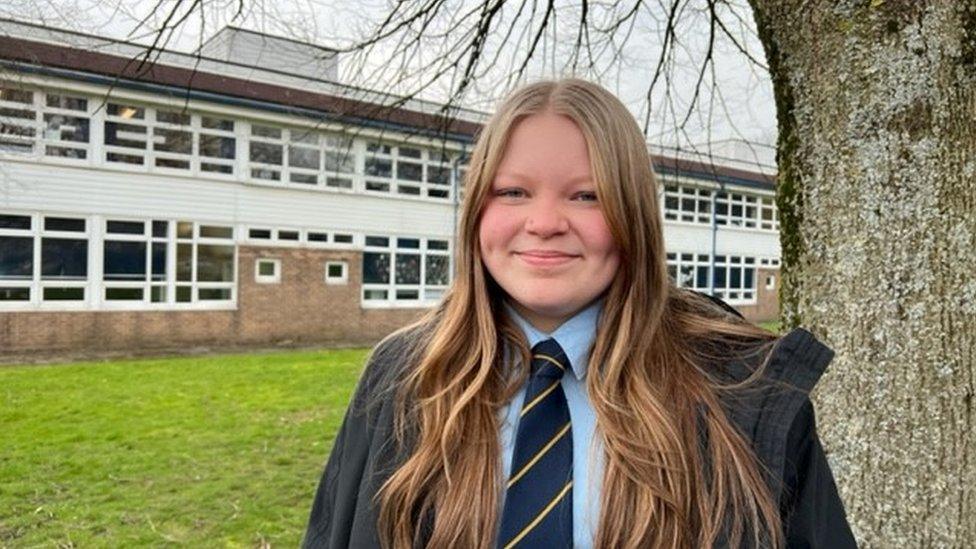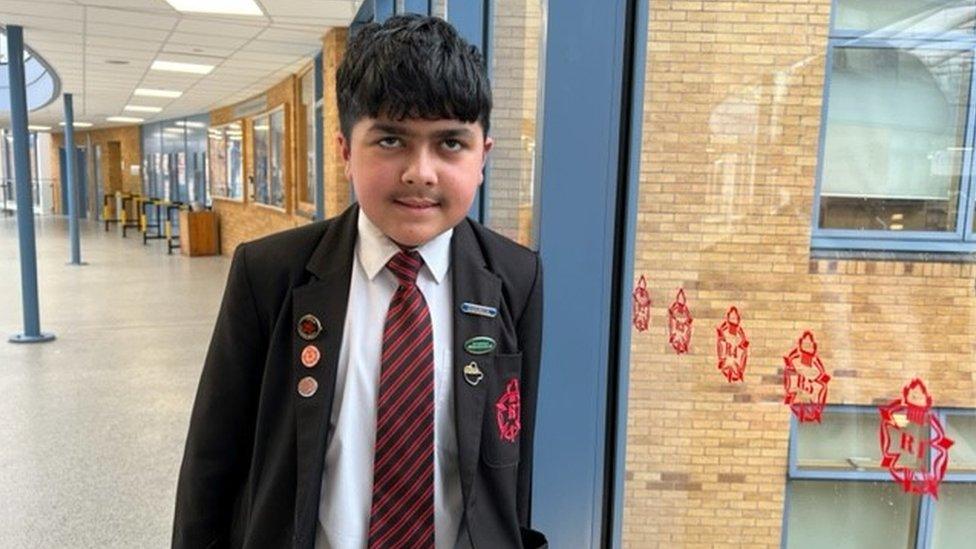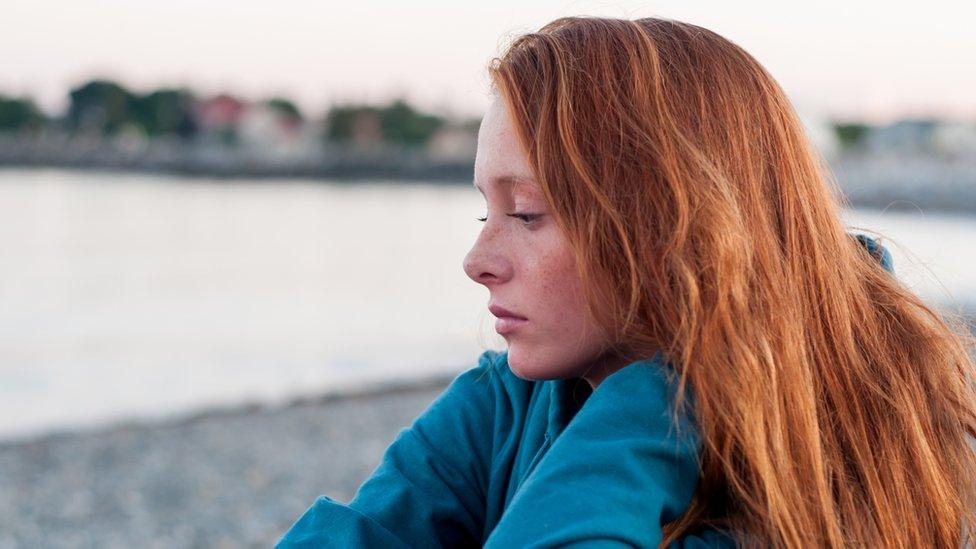Girls face more pressure to be a perfect teenager
- Published

Saint dropped out of football because she was the only girl
Teenage girls sleep and exercise less than boys, and are three times as likely to report struggling with their mental health, a study suggests.
Those are among findings drawn from the experiences of almost 40,000 teenagers across Greater Manchester.
Young people worked with academics to devise a questionnaire for the BeeWell research project., external
It is thought to be the largest attempt to analyse young people's wellbeing in one region, and runs for three years.
Saint, one of the Year 10 pupils who responded, wasn't surprised the first results reveal some marked differences between the experiences of girls and boys.
Girls were three times as likely - at 22% - to report serious emotional difficulties, as boys at 7%.
Saint, who wants to be a scientist, dropped out of football because she had had enough of feeling unwelcome as the only girl.
She said: "I think a lot of it today is about looking good for other people, being who other people expect you to be - the perfect girl. Especially today when lots of people are questioning who they are, and their identity."
She said there was pressure to construct a life that looks busy, even if you don't have people you can talk to properly in reality.
Social media use was higher among girls, an average of 4.8 hours a day, and 46% reported not getting enough sleep.
The teenagers I spoke to said social media could be a source of support, but also added to the pressures on girls around body image.

Ruby said girls struggled more with confidence issues
Across the city, Ruby, another Year 10 pupil, said confidence was an issue.
"I think it's clear, it is more in women to struggle more. In my opinion boys can be cocky with the things they know and it puts other people down."
Different for boys
So do boys feel they have more freedom?
Two Year 8 boys told me they thought that was true, not least in sport because the choice for boys is wider.

Saad thinks boys have more licence to mess around
Saad said he thought boys had much more leeway to be "mischievous" and mess around.
Overall a third of the teenagers reported being active for an hour a day, including just walking, but for girls that fell to just 26%.
Researchers think it's also possible there is less space for boys to express vulnerability.
Ahmed, who doesn't really use social media, said: "As boys we express our emotions less, we're expected to be stoic."
The research will be analysed to show the differences in wellbeing between different neighbourhoods across the city region.
That could be revealing in the contrast between wealthier and more deprived areas, but also the many different communities in a big urban area.
A year 8 pupil Maria told me she was allowed to go to friends and to the shops on her own, but many other girls aren't.
The generational shift in issues around identity and gender are also apparent in the study, with 2.7% identifying as gay or lesbian and a further 7.7% as bi or pansexual.
Saint said: "I don't think it really surprises me at all. As celebrities, for example, have decided who they are, it's become easier for young people to look at the people they admire and think it's OK to express myself.
"It's more common now for people to ask themselves who they think they are at a younger age."

Ahmed, pictured with Maria, said he thinks boys may have more freedom, but are expected to control their emotions
The findings in this research suggest teenagers identifying as gay or lesbian are twice as likely to be bullied in some way.
Ahmed said: "If you're LGBT you might be harassed. I think identity plays a really big part in society."
Prof Neil Humphrey, from the University of Manchester, said what made BeeWell different was the involvement of 150 teenagers in designing the research questions.
Insights have already been fed back in confidence to all the secondary schools which took part to inform their welfare policies.
A breakdown of the data by neighbourhoods will be used to select some for further pilot projects in which young people will have a budget to direct on improving local wellbeing.
"We are about immediate impact and insights into the lives of young people," he said.
Related topics
- Published27 December 2021

- Published30 September 2021
